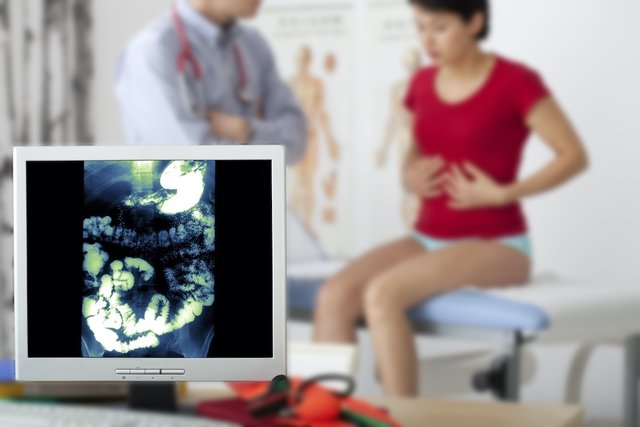Barium enema is a diagnostic test that uses X-rays and contrast, usually barium sulfate, to study the shape and function of the large intestine, colon, rectum and anus, and thus detect possible intestinal problems, such as diverticulitis or polyps, for example.
This exam can be carried out on both adults and children and can be divided into a simple barium enema, when only one contrast is used, and a barium enema with double contrast, when more than one type of contrast is used.
To perform the exam, which is also known as opaque enema, it is important that the person follows the doctor’s recommendations, such as fasting and intestinal cleansing so that the intestine can be correctly visualized.

What is it for
The barium enema exam is indicated to investigate possible changes in the intestine and diagnose diseases or problems such as:
- Ulcerative colitis;
- Crohn’s disease;
- Bowel cancer;
- Non-intestinal tumors;
- Diverticulitis;
- Diverticulose;
- Bowel obstruction;
- Twisting in the intestine;
- Intestinal polyps;
- Chronic constipation;
- Chronic diarrhea;
- Bloody stools;
- Rectal bleeding;
- Chronic pain in the abdomen.
Furthermore, in children, the enema exam can also be indicated as a form of screening for children who will undergo rectal biopsy due to suspected Hirschsprung syndrome, also known as congenital megacolon, in which there is an absence of nerve fibers in the intestine. , preventing the passage of feces. Learn more about congenital megacolon.
How to prepare for the exam
To perform the barium enema exam, it is important that the person follows some doctor’s instructions, such as:
- Follow a specific dietlow in fiber, fatty foods and seeds, for 2 days before the exam, as advised by the doctor;
- Use laxatives and medicine for intestinal gas recommended by the doctor, the day before the exam, to clean the intestine and eliminate gases, which can interfere with the image;
- Follow a liquid diet the day before the examrecommended by the doctor, giving preference to water, soup, teas and natural gelatin, as they are easily digestible and do not leave residues in the intestines, which must be empty;
- Absolute fasting approximately 8 to 10 hours before the exam;
- Do not smoke or chew gum during fasting;
- Tell your doctor if you are allergic to barium or any other type of radiological contrast, medicine or food, before taking the exam;
- Bring a list of all medicationsvitamins and nutritional supplements that you take frequently
- Take your usual medicines normallywith little water, as per medical advice;
- Inform if you are pregnant or suspect pregnancyin the case of women;
- Avoid taking medications that have not been prescribed by your doctorincluding home remedies and teas;
- Take an enema on the day of the examto remove any residue present in the intestine.
Preparation for barium enema in children over 2 years of age includes offering plenty of fluids during the day and giving magnesium milk after dinner the day before the exam. If the test was requested because of chronic constipation or megacolon, preparation is not necessary.
How the exam is carried out
The barium enema exam lasts around 40 minutes and is performed without anesthesia, which can cause the person to feel pain and discomfort during the exam. Therefore, some doctors prefer to request a colonoscopy because it also serves to evaluate the large intestine, making it safer and more comfortable for the patient.
To perform the barium enema exam, the doctor must follow some steps:
- Carrying out a simple X-ray of the abdomen before starting the exam, to check if the intestine is correctly cleaned;
- Place the person lying on their left side, with the body leaning forward and the right leg further in front of the left leg;
- Introduction of a probe through the anus to apply barium contrast;
- Injection of barium contrast directly through the rectal probe;
- Repositioning the person so that the contrast can be spread;
- Removal of excess contrast and injection of air to dilate the intestine, making all portions visible;
- Removal of the rectal probe;
- Taking several x-rays to evaluate the intestine.
During the exam, the person may feel the urge to have a bowel movement, especially after the air injection and, after the exam, they may feel swelling and pain in the abdomen and an urgent urge to have a bowel movement.
Care after the exam
After the barium enema exam, it is normal for the person to have constipation for a few days and for the stool to turn white or gray due to the contrast, so it is very important to increase the consumption of foods rich in fiber, such as whole grains and fruits with peel, and drink 2 liters of water a day.
In the case of children, this can also happen, so it is important for parents to offer the child plenty of fluids after the exam.
Possible complications
Complications related to the barium enema exam are rare, however, allergic reactions to barium contrast, intestinal perforation or inflammation, intestinal obstruction, or fecal impaction or severe constipation may occur.
Therefore, it is important to notify the doctor or seek the nearest hospital if symptoms such as belly swelling, dizziness, weakness, fever, blood in the stool, severe abdominal pain or inability to defecate or eliminate gas appear.
When it should not be done
The barium enema exam should not be done in suspected or confirmed cases of pregnancy. Furthermore, this test should not be performed on people who are allergic to barium, have severe rectal inflammation, or who have recently had a rectal biopsy.
Bibliography
- TODAY, SM; et al. Sodium Picosulfate/Magnesium Citrate. Springer Nature in Drugs. 69. 123-136, 2009
- UNIVERSITY OF CALIFORNIA – PREPARE FOR A BARIUM ENEMA EXAM. Prepare for a Barium Enema Exam. Available at: <https://radiology.ucsf.edu/patient-care/prepare/barium-enema>. Accessed on 12 Dec 2022
- ANDRADE, Vera Lúcia A. et al. Topographic assessment of the transverse colon using barium enema: definition, prevalence and proposed classification of transverse colon ptosis. GED gastroenterol. endosc. dig. Vol 33. 3 ed; 83-87, 2014
- PEYVASTEH, Mehran et al. Diagnostic Accuracy of Barium Enema Findings in Hirschprung Disease. ABCD Arq Bras Cir Dig. Vol 29. 3 ed; 155-158, 2016
- BOTUCATU FACULTY OF MEDICINE. Technical peculiarities for performing barium enema in the diagnostic investigation of Hirschsprung’s Disease. 2015. Disponível em: <https://www3.fmb.unesp.br/sete/pluginfile.php/8115/mod_resource/content/6/Peculiaridades%20t%C3%A9cnicas%20para%20a%20realiza%C3%A7% C3%A3o%20de%20enema%20opaco%20na%20investiga%C3%A7%C3%A3o%20diagn%C3%B3stica%20da%20Doen%C3%A7a%20de%20Hirschsprung_Felipe%20Gilberto%20Valerini.pdf>. Accessed on 17 Apr 2020

Sign up for our newsletter and stay up to date with exclusive news
that can transform your routine!
Warning: Undefined array key "title" in /home/storelat/public_html/wp-content/plugins/link-whisper-premium/templates/frontend/related-posts.php on line 12
Warning: Undefined array key "title_tag" in /home/storelat/public_html/wp-content/plugins/link-whisper-premium/templates/frontend/related-posts.php on line 13



